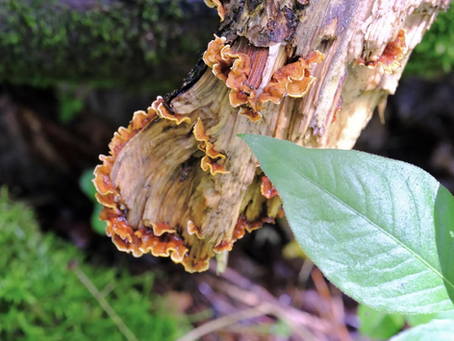H is for History, Humanity, and (dare I say) Hope
- Oct 15, 2025
- 3 min read
July 9, 2025
“The most radical thing any of us can do at this time is to be fully present to what is happening in the world.”
~ Joanna Macy*
Yesterday it rained in Pittsburgh. Nothing like what happened in Kerr County, Texas, where the Guadalupe River burst its boundaries, sweeping away far too many children and adults. Our rains were more short-lived, more gentle, less lethal.
When the rains had subsided, I went out to see Mingo Creek and the woods and trails. The creek was definitely higher and livelier than usual. The paths were muddy and slippery. Plants along the trails still carried the kisses of the raindrops, glistening like diamonds whenever the sun broke through the tree tops.
I love to take pictures of ancient plant life that often proliferate after a heavy rain – the fungi, mosses, ferns, lichen. These forms of life comfort me. They remind me that life has been around for a long, long time, far before humans ever came on the scene. I get a sense of reassurance from this long view of history. It helps me to imagine that we humans will also go on, in spite of ourselves, into a future that is yet to be determined.
In environmental activist circles, we like to remind ourselves of humankind’s late arrival to our Earth home. There are versions of a year-long calendar that outline the history of the entire universe. On one such calendar, the Big Bang starts everything off on January 1. Earliest sun-like stars don’t appear until May 5. September sees life emerging on Earth, with multicellular organisms not arriving until early December. Dinosaurs go extinct on December 30.
On December 31, at about 11:53 pm, Homo Sapiens emerge. WHAT? In the final minute of the year-long calendar, the wheel and writing are invented. With a second to go, the agricultural revolution happens, and less than a second sees the onset of the industrial revolution. We are living in such a teeny-tiny slice of time.
Wow. I think often about this vast historical perspective. I remember that humans are late to the game, and in our short life span, we have faced many challenges that have felt daunting and insurmountable. And we have prevailed.
The historical perspective also reminds me that those humans who first began to grow crops and domesticate animals could never have imagined what the industrial revolution would bring. My grandparents and parents could never have imagined our lives with 24/7 access to data and information and… misinformation. We humans move inexorably into the unknown.
The reality is that, when we are here, in the present times, it is difficult to see how we could possibly get ourselves out of the mess we are in and begin to move humanity toward a more just, compassionate, and creative future, one that respects and honors not only all other humans but also the rest of life and our planet. How can humanity, as a whole, do this? Can we do it?
Life is rife with uncertainties and the future cannot be known. That is uncomfortable to most of us.
And yet. In the midst of the unknown, we hope. We hope, not with any sense of certainty of an inevitable outcome but, as writer Rebecca Solnit notes, with a recognition that…
“…in the spaciousness of uncertainty is room to act. When you recognize uncertainty, you recognize that you may be able to influence the outcomes – you alone or you in concert with a few dozen or several million others…[Hope] is the belief that what we do matters even though how and when it may matter, who and what it may impact, are not things we can know beforehand.”
Hope is more than a feeling or attitude. Hope calls for action.
I feel hope when I hear Harvard professor Erica Chenoweth describe their research showing that, historically, authoritarian movements have been reversed when 3.5% or more of citizens are engaged in nonviolent protest. When folks set out to resist, the outcomes are unknown, but passion and commitment have moved the needle in the right direction.
And I feel hope when I see my friends, the mosses and fungi and ferns, and remember how far we humans have come.
*I send love and prayers out to Joanna Macy, environmental activist, author, and scholar of Buddhism, general systems theory, and deep ecology, in hospice care at this time. She is a very wise woman who has inspired so many people to live more gently and compassionately on this Earth.
Photo from Mingo Creek Park
2024-2025




























Comments